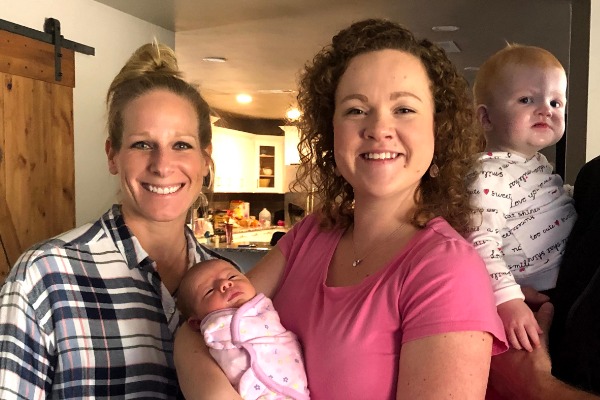FMLA & Adoption: Do Birth Parents Get Maternity Leave?
What to Know About Giving a Baby Up for Adoption and Maternity Leave
Maternity leave may seem a bit more complicated for a pregnant woman considering adoption because she would not have a child to care for after birth. She might be wondering if she’ll be eligible for maternity leave. Contact us online or at 1-800-ADOPTION to get basic information now, and to learn more about maternity leave and adoption.
Placing a baby for adoption is an exhausting process — emotionally, mentally, and physically. Like any new mother, birth mothers deserve a chance to recuperate from their delivery and adoption processes. “Giving a baby up” for adoption at birth and maternity leave are not mutually exclusive.
You have just as much right to protected leave from work after childbirth as any woman — although you may have to advocate for it yourself.
You can always contact an adoption professional at American Adoptions by calling 1-800-ADOPTION to get more information about other available financial assistance before and after your delivery, and how we can help. You can also fill out our online form to be put in touch with our adoption professionals. They can walk you through the maternity leave process during your adoption and answer any other adoption-related questions you may have.
Below, you can find more information about maternity leave and adoption.

FMLA Adoption: How It Works
A woman who delivers a baby has a lot to cope with after childbirth, even if she’s not going to be raising her child. Not only will she need to recover from the physical aspects of having a baby, but she will likely also be exhausted mentally from the long nine months she has had. If a woman has placed a child for adoption, those emotional aspects may be much stronger.
Do people take time off work after giving a baby up for adoption? Yes, they do.
The good news is that “giving a baby” up for adoption does not eliminate maternity leave for a birth mother. Maternity leave in the United States is regulated by the Family Medical Leave Act of 1993 (FMLA), which protects a woman’s right to unpaid maternity leave, as long as she meets certain requirements. In situations of “giving up a child,” FMLA does still apply.
Maternity leave, also known as “maternity disability” or “medical leave,” is provided by this federal act to American workers. To receive unpaid time off to recover from childbirth, a woman will need to have held her job for at least a year and worked at least 1,250 hours. FMLA also only applies to companies with more than 50 employees.
In most cases, maternity leave allows six weeks for normal vaginal delivery and close to eight weeks for an uncomplicated C-section.
However, not all birth mothers are eligible for maternity leave and of those who are, not all of them take their full maternity leave. In fact, many women feel physically well enough to return to work within a week, as their recovery time is not impacted by caring for a newborn baby.
Unfortunately, many parents — both birth and adoptive — find themselves cutting short their maternity leave because of financial reasons. Because many companies do not provide paid maternity leave, new parents are sometimes forced to return to work early to make ends meet for their family.
While adoption does offer some financial benefits to birth parents after delivery (more on that below), the lack of payment during maternity leave inspires many to take a short leave or no leave at all, even if they are entitled to one.
Helpful Information
How to Advocate for Your Maternity Leave
If “giving a baby up” for adoption at birth and maternity leave is on your mind, it’s important that you speak with your employer as early as possible. Because employers’ policies vary so much, you won’t know what medical leave options are available to you until you do.
Talking about pregnancy and childbirth with your employer can sometimes be awkward, especially if you work in an industry in which pregnant women and mothers are discriminated against. You may be worried about losing your job if you announce your pregnancy. While there is a law to protect you from that, it’s unfortunately not unusual for employers to reduce the number of shifts and other benefits for a female employee upon learning of her imminent departure. Pregnancy discrimination is real, and it’s something to consider.
If you are unsure whether you are allowed maternity leave under FMLA for your adoption, schedule a meeting with your HR representative. Before this meeting, prepare a maternity leave letter, just in case, and be ready to address complicated issues, like covering your responsibilities while you are gone. Most importantly, you’ll want to come in with a set number of weeks you anticipate taking off work.
Don’t be afraid to discuss your adoption plans with your employer, even if it seems uncomfortable. If you explain your decision, they will understand where you are coming from — and perhaps be happy to hear you may return earlier than a woman raising a child after delivery.
If you need advice on how to talk with your employer about FMLA for parents “giving up” a child for adoption, you can always contact our adoption professionals.
How American Adoptions Can Help After Childbirth
Sometimes, prospective birth mothers are not eligible for maternity leave. Other times, because their leave is unpaid and their employers will not hold their jobs, they choose to quit before delivering with the goal of getting another job after the baby is born. If you are in one of these situations, you may face financial difficulties.
Fortunately, if you work with American Adoptions you can be provided financial assistance before, during, and after your adoption process. Our adoption professionals will make sure your adoption and medical costs always come free to you, and you may even be eligible for extra living expenses, too.
Living expenses may include:
- Rent and utilities
- Food
- Transportation
- Maternity clothing
- Phone service
- And much more
While these living expenses are important during pregnancy, they can also be extremely useful after childbirth. In most cases, birth mothers like you can receive financial assistance up to six weeks after the birth of the baby.
For more information about financial assistance during your adoption, please call our agency at 1-800-ADOPTION.
“Giving a baby up for adoption” at birth and maternity leave can be complicated topics for you and your employer, but there are important considerations in this process. As an expectant mother, you have the right to recover from your delivery and adoption process in whichever way you see fit — whether it is with maternity leave, with adoption financial assistance, or both.
We encourage you to talk with our adoption professionals for more advice on what is best for you. Fill out our online form to get more information on your rights as a birth mother when it comes to maternity leave.
Disclaimer
Information available through these links is the sole property of the companies and organizations listed therein. American Adoptions provides this information as a courtesy and is in no way responsible for its content or accuracy.








































